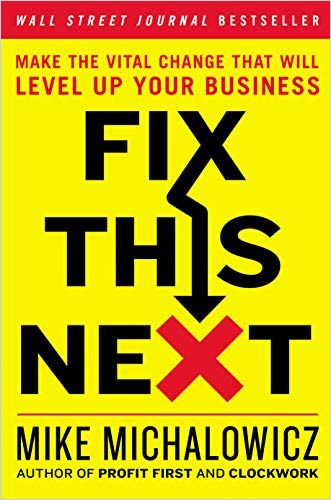Prolific author Mike Michalowicz offers familiar sales advice in a new package: repurposing Maslow’s hierarchy of human needs for businesses.

Take Five Purposeful Steps
Host of the Entrepreneurship Elevated podcast, Mike Michalowicz offers a road map for finding and fixing the problems holding your business back. He argues that five levels of needs are fundamental to all businesses. Michalowicz – also the author of Profit First, Clockwork and The Pumpkin Plan – explains how to diagnose your firm’s pressing problems and determine which ones to address first. He enlivens his prescriptions with detailed examples and stories from his entrepreneurial ventures.
Five Levels
Michalowicz offers the “Fix This Next” (FTN) analysis, which outlines a “Business Hierarchy of Needs” (BHN) that refers to Abraham Maslow’s 1943 psychological hierarchy of needs.
Even if you can make time to tackle your business’s needs, where should you start? Mike Michalowicz
Maslow depicted human needs as a five-level pyramid.The bottom level covers “physiological” needs – the bodily essentials, including food, water and sleep.The next level is “safety,” meaning shelter, health and financial stability.The third level is “love and belonging,” reflecting the need for community, friendship and family.The fourth level is “esteem,” meaning the need for self-confidence, respect and achievement. The peak of the pyramid is “self-actualization” the need for such life-shaping traits as morality, creativity and problem-solving, characteristics people can develop after they meet their basic needs.
Michalowicz’s entrepreneurial business hierarchy of needs likewise depicts five levels of business essentials, each of which contains its own five subsidiary “core needs”
The Need for Sales
Michelowicz believes that business owners’ biggest problems include often being unable to identify their biggest problem and set priorities. For instance, he says, businesses often err by setting arbitrary sales targets or believing the more sales, the better. The clue is whether your sales are profitable.
The five needs at the sales level are personal income, leads, converting leads into clients, deliverables and collections.
Determine whether your sales are paying off by considering how much take-home pay and profit you should be able to withdraw. Calculate how much you need to support your lifestyle, eliminate debt and start saving. Get the word out about your product or service and try to attract high-quality clients. Analyze whether your offerings align with your clients’ needs. A business focused on top quality and a customer looking for basement prices don’t match. To retain buyers, keep communication open. Try to exceed expectations but be transparent if you can’t. And, always collect the money you’re owed.
The Need for Profit
Entrepreneurs, Michalowicz cautions, often count money their business earns as profit. Real profit is how much you can take from your business without harming it.Reinvesting profits back into the business is a tautology: money you put into your business is always an expense.
Profit is a reward for the tremendous risk you have taken on as an investor.Mike Michalowicz
The five subsidiary needs at this level are to cut debt, maintain margins, earn repeat business, leverage debt for growth and keep a cash cushion.
To make the most of your revenues, Michalowicz advises, adopt a “profit first” strategy once you satisfy the other needs in this category. Reverse the usual process: instead of paying bills and calling the remainder profit, take your profit first. Create a separate bank account for profits and deposit a predetermined percentage of your earnings there. Pay bills with the remaining money.
Then reduce debt. If you can’t meet expenses without debt, cut costs. Add your monthly costs and multiply the sum by 10%. Cut that amount immediately from your business expenses. Repeat monthly until you’ve cut the fat.
You may be tempted to keep your margins thin because you fear higher prices will scare away customers, but your best customers will support price increases because they want a competent, reliable supplier. Focus on a limited range of offerings for specific customers.
Debt can be beneficial if you use it to fund activities that guarantee a boost in profits within a set time. For example, borrow to acquire inventory if you can sell it and get paid before the debt comes due. And, Michalowicz emphasizes, keep sufficient cash on hand to cover at least three months of expenses.
The Need for Organizational Order
As a business grows, operations become more complex. To achieve the results you anticipate, institute new systems and enhance existing ones. To enhance operational order, consider five needs: efficiency, tasks that fit employees’ talents, empowered employees, backups for essential personnel and a good reputation.
For organizational order, first, fulfill the core requirement for efficiency. Analyze the steps you take to deliver your product or service. Find and fix bottlenecks or tasks that take longer than they should.
With all of its organizational efficiency needs met, your business can run – and yes, even grow – no matter who is on your team.Mike Michaelowicz
Confirm that people’s responsibilities make the best use of their talents. Trust the frontline people who work directly with a certain function; give them the authority to make changes.
Sometimes a boss or senior employee becomes a linchpin – so competent and versatile that operations suffer when he or she is absent. Train backups so your firm thrives even when such folks are absent.
Get the word out that your company is the best at what it does. Successful specialized businesses establish a reputation that attracts high-quality clients.
The Need for Impact
The first three levels of the business pyramid of needs are “get” levels where you make sure you are profitable. The next two are “give” levels, and they matter just as much. Focusing exclusively on getting, Michal0wicz reminds you, destroys stakeholder goodwill. However, to give long-term, you must first establish a foundation of getting.
For impact, meet these five needs: Transform your relationships to benefit your vendors, customers and community. Motivate your staff by outlining a mission they can embrace. Inspire employees with perks beyond money, such as a flexible schedule. Enable clients and other stakeholders to comment on your performance. Collaborate with other businesses. Providing referrals for products or services you don’t offer generates goodwill and earns reciprocation.
The Need for a Legacy
The core needs at this level include community, leadership, customer and employee evangelism, quarterly evaluations, and adaptability.
Legacy is about intentionally leaving your mark in the way you envision.Mike Michaelowicz
In your community, your company pleases customers by fulfilling its unique mission. Leadership including setting up a clear succession plan. Channel customer and employee enthusiasm to nurture passion in your clients and employees by treating them as a community. This is in line with the model established, for example, by Disney, Apple and Starbucks.Quarterly evaluations help you pursue your mission consistently. And, adaptability keeps your business sufficiently agile.
The Point of the Pyramid
Mike Michalowicz has either found an entirely new way to frame straightforward business advice, or he’s stretched a bit to establish a structure for his book. How new and effective his advice seems to you will tell the tale. The author invests wholeheartedly in a novel concept, though his attempt to parallel business needs with human needs meets with varying levels of success. In some places, the construct gets a little clunky. At other times, Michalowicz achieves the business book ideal: he structures well-accepted business advice in a way that makes it easier to follow and implement. The proof is whether it meets your needs.






